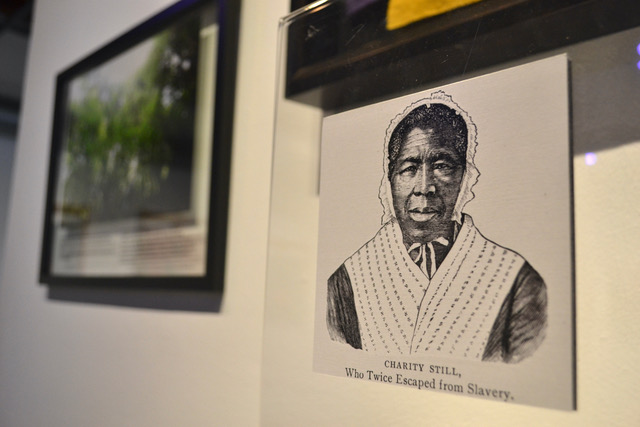February 25, 2021 | By Denzel Johnson-Green
Recently at The Studio@620
curated by Bob Devin Jones, hung by Marcus Wehby
The Installation: The Three Petal Dance
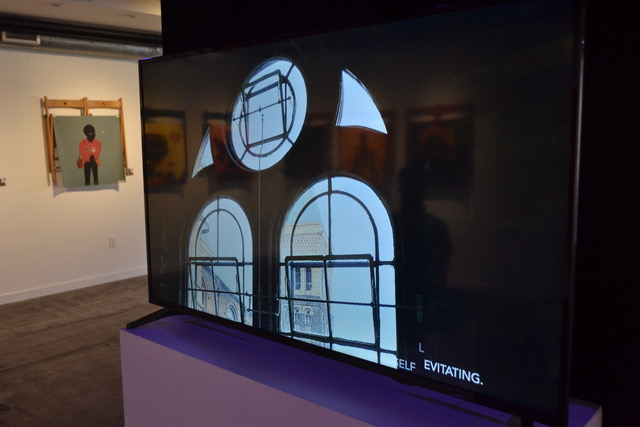 . . .
. . .
Jazz sucker punches from the Studio@620’s speakers
an invisible saxophone leads lively conversation
with the paintings and photographs on the wall.
Beautifully dark faces from Nick Davis,
well positioned travel photography from William Lunderman,
and groovy, expressionistic paintings
on scenes around St.Pete from Evan “Cool Art” Niemann.
Tenea Johnson’s installation punctuates the middle of the studio;
a short, white wall as you walk in, a perfect square 4×4 feet
just behind, a much taller wall, a nosebleed sorta fella
holding a framed piece in the middle,
with two photographs printed on foam, flanking the sides
. . .
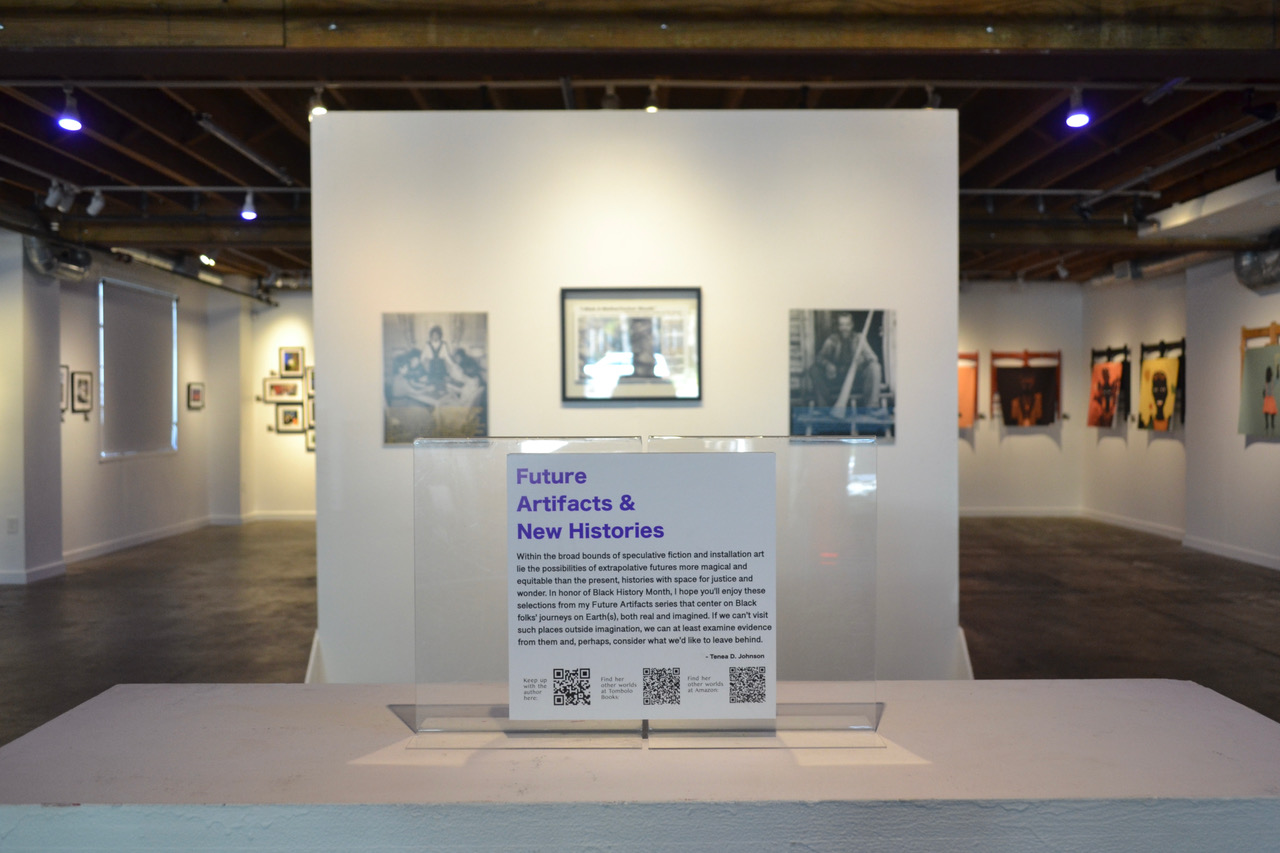
. . .
pictures from another era haunt,
whisper without moving mouths,
gossiping where there are no lips or ears
to receive rumor.
The opposite side of this wall is a similar set up. Three pieces, with a single free standing
column in the middle holding the image of a Black elder it reads:
. . .
“This is not fiction; this is poetry.”
. . .
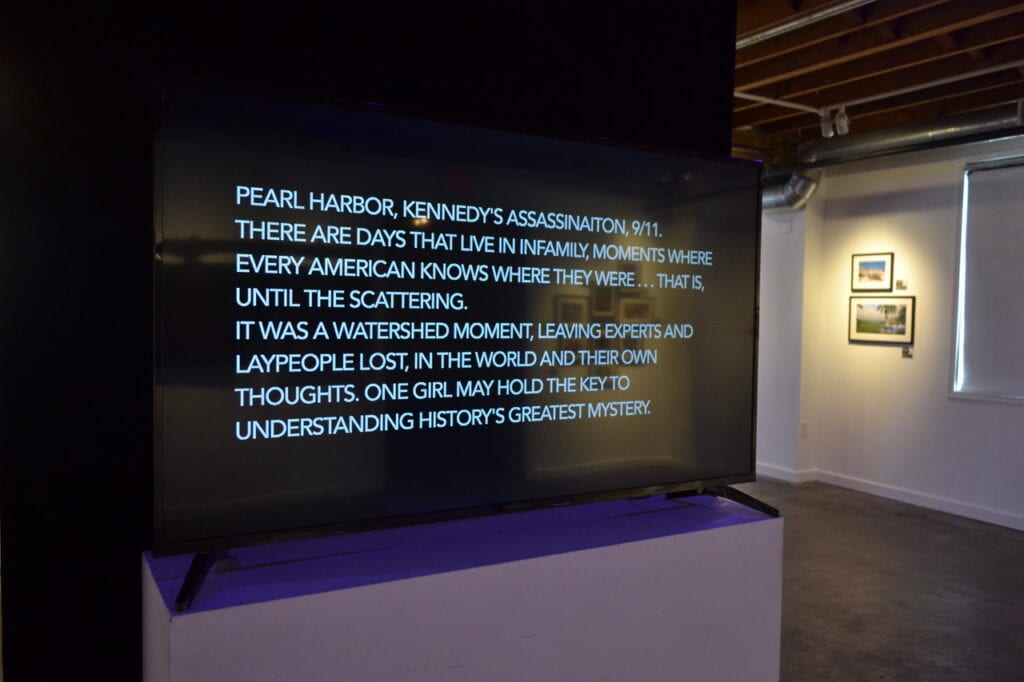 . . .
. . .
A black curtain stands beyond even this, and on the other side of that curtain, a tv screen, a portal to the story of a fourteen year old girl named, Quet Daniels, that lost her father in a Twilight Zone kind of event that reverberated around the world with a sound like when lava meets the ocean and it cracks and smothers itself under the pressure of waves and salt and insane brine. This event would be known as “The Scattering”.
. . . . . . . . . . . . . . . . . Chinese lanterns of vermillion and bullion
. . . . . . . . . . . . . . . . . and billions of molecules rearranging into
. . . . . . . . . . . . . . . . . something with fangs and soft cuspids.
. . . . . . . . . . . . . . . . . Skeletons from underwater behemoths
. . . . . . . . . . . . . . . . . mammoth bones, agate, quantum entanglement
. . . . . . . . . . . . . . . . . . . . . . . . . . . . levitation
“The next step lead to nothingness”
. . . . . . . . . . . . . . . . . She finds her father in her father’s dreams,
. . . . . . . . . . . . . . . . . a tunnel of a thing with rings and rings
. . . . . . . . . . . . . . . . . Saturn’s jealous lover, a hypnotist’s lover
. . . . . . . . . . . . . . . . . on the other side,
. . . . . . . . . . . . . . . . . greens and greens and greens and greens
. . . . . . . . . . . . . . . . . and then,
. . . . . . . . . . . . . . . . . the place of your father’s mother’s mother and
. . . . . . . . . . . . . . . . . the stringy, spindly roots of your people
. . .
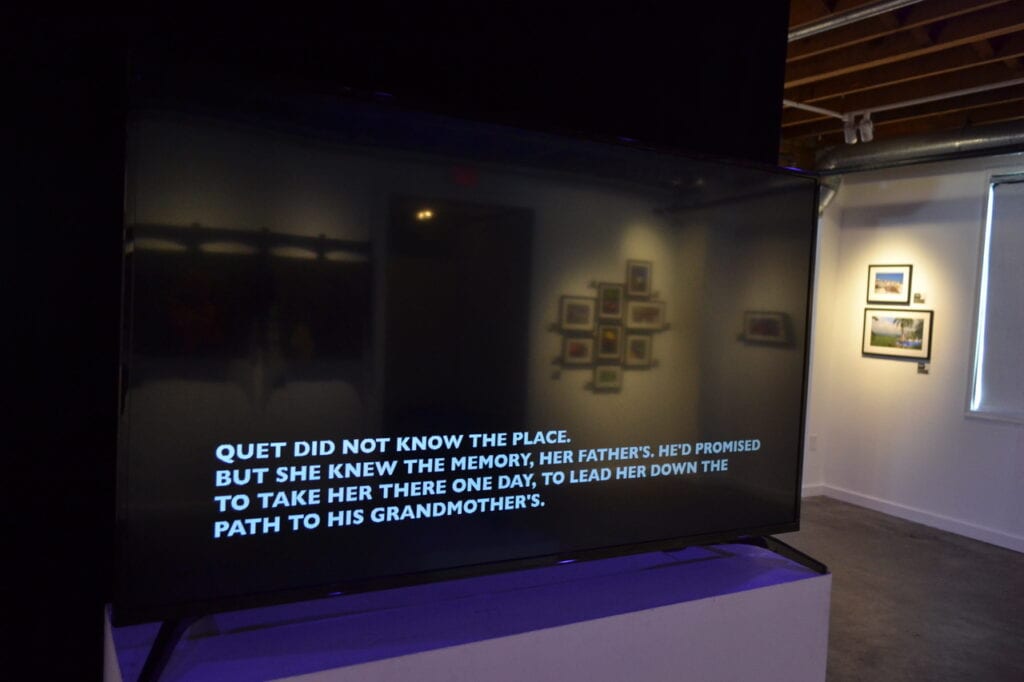
. . .
On the piece “Grace Society”
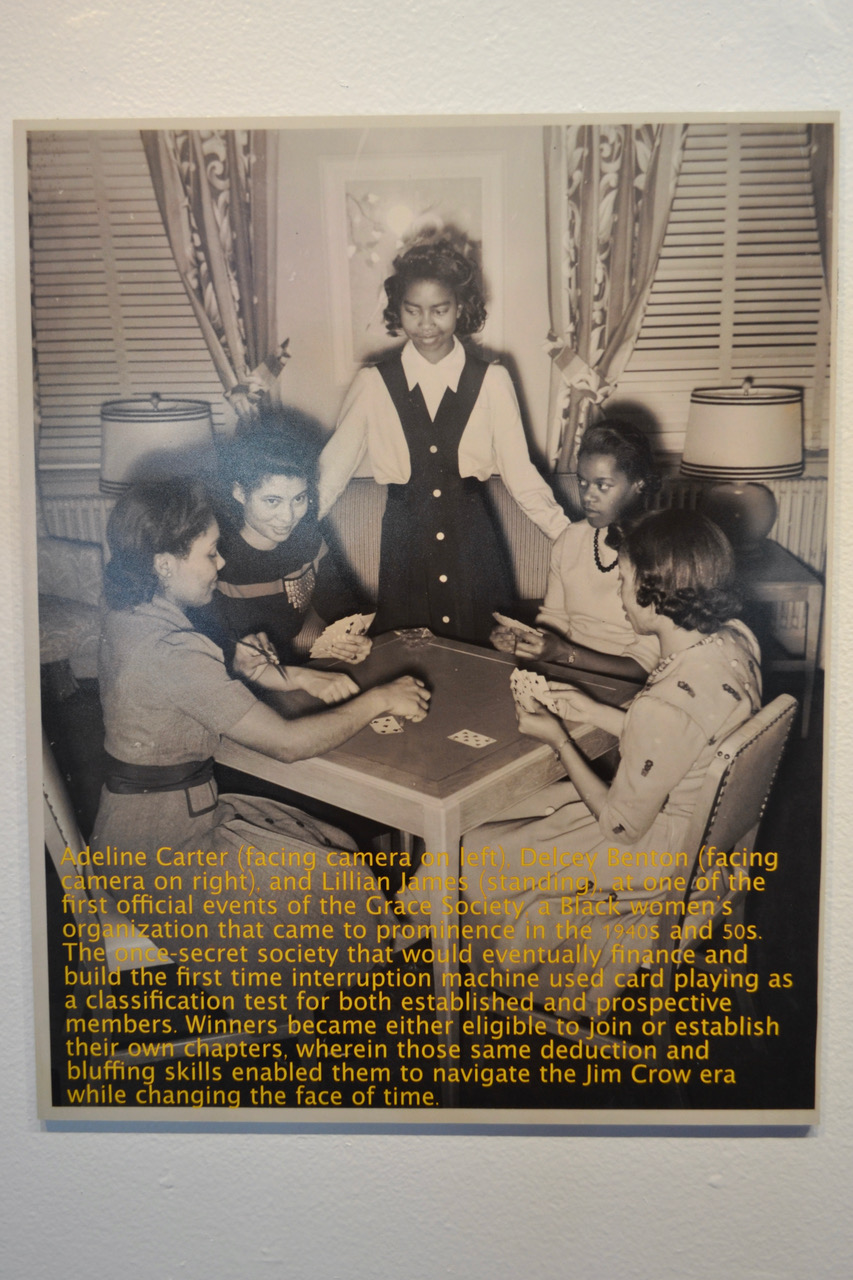
. . .
I like how haunting this photograph looks. Though, it’s likely just the effect of looking at an earlier time period through an “obsolete” and unfamiliar medium.
The comparatively low quality picture ushers in vagueness, a coldness of something like cold snaps when yesterday was so warm outside, or cold spots in your apartment.
This picture is identical to our own time period, but somehow way off; that uncanny valley, that off-key sound in not recognizing those who are supposed to be your kin.
But the shakiness wears off when you read the message printed on the picture. You remember how your ancestors clawed for freedom, how they hid away amongst themselves, and made buddies of night, drawn curtains, and dim lamps with no White people to look and gawk and inspect.
It’s a black and white picture of five women playing cards, with the host, Lillian James, standing in the middle.
. . . . . . . . . . . . . . . . . . . . . . . . . . Delcey Benton sits on the right.
. . . . . . . . . . . . . . . . . . . . . . . . . . She is dark skinned and beautiful
. . . . . . . . . . . . . . . . . . . . . . . . . . as a night with no moon.
. . . . . . . Her eyes, steady,
. . . . . . . a cowgirl, hand on
. . . . . . . revolver
. . . . . . . scratch that,
. . . . . . . just a finger
. . . . . . . 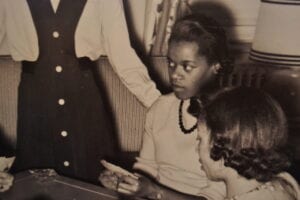
scratch that
. . . . . . . just a tip
. . . . . . . of the
. . . . . . . middle finger
. . . . . . . sweat and flesh
. . . . . . . just grazing
. . . . . . . the leather
. . . . . . . of the holster
. . . . . . . potential energy
. . . . . . . like a spring
. . . . . . . squeezed down
. . . . . . . to spaces smaller
. . . . . . . than under the fridge
. . . . . . . and like my people
. . . . . . . she waits
. . . . . . . and she watches
. . . . . . . and she listens
. . . . . . . for her people to come up
. . .

. . .
“Do you think secret societies really exist?” – a young man asked me as he walked shyly around the gallery, his feet asking the concrete where they can land. “Do you think they’re still around?”
“Why of course I do,” I replied. I fidgeted with my mask, “The fact that you and I haven’t heard of them means they’re doing a pretty good job.”
. . .
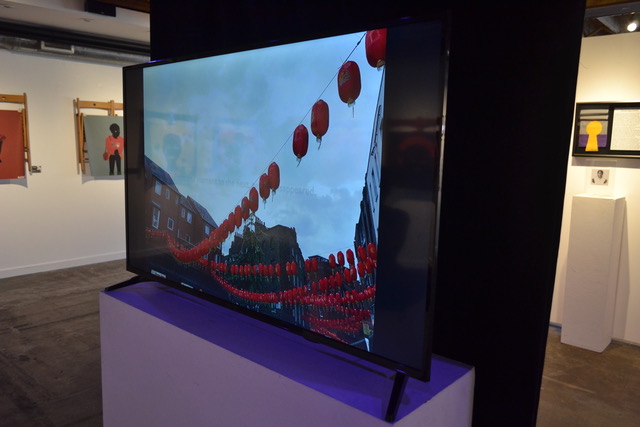
. . .
I chuckled and he looked at me sternly and actual concern set the tan table of his face. Cherry, or Hickory faced. “There have been countless forms of secret societies in virtually every country, and in the places before countries.
“Wherever people have felt marginalized or wronged, whether they actually were or not, people have found ways of linking up with like minds, and finding togetherness where some dominant group wouldn’t allow. Christians in China are often persecuted for example. They have to hold bible studies in secret, in people’s basements and things. And the government storms these meetings pretty regularly.”
“Oh, or like the Uighurs?”
“Right! The muslim religious minority in Northwest China. They gotta hide themselves away, or be sent to ‘re-education camps.’ So they, just like a lot of the African Americans in the early to mid 20th century, had to hide themselves. Tuck themselves away, folded, folded, folded in on themselves until they were nothing but origami cranes and dragons somewhere between rib and stomach. And they waited and watched and plotted. But they were together, and a few of them would plot to see their descendants unfolded and uncompromising and lavish and godly.”
His look was less grave, more sure footed. A young goat, looking down at his descent, the valley beneath, uncanny, green, slippery, but manageable, workable, climbable.
. . .
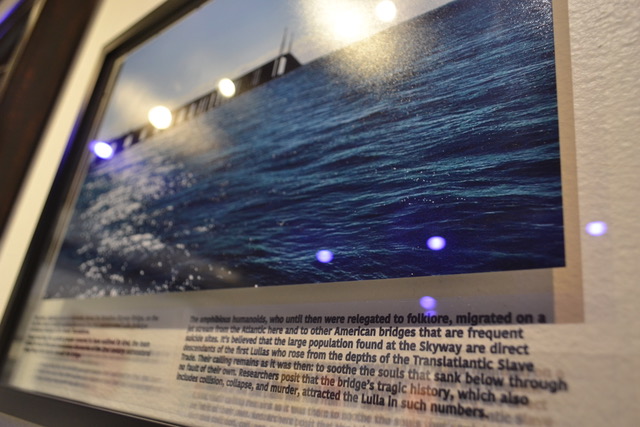
. . . . . . .
Why he stayed
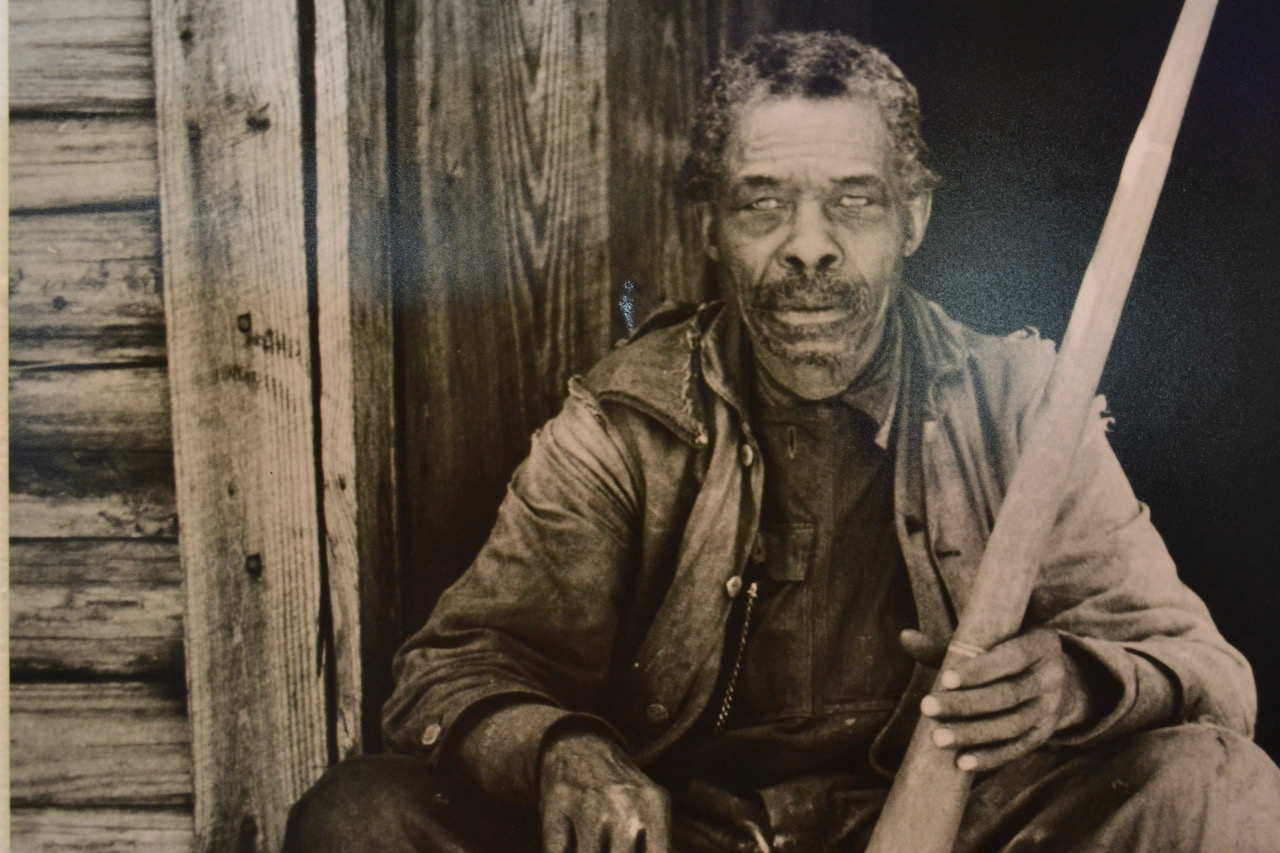
. . .
This piece shows a Black elder sitting down in an old jacket, even older pants, and scraggly facial hair you can’t tell where it stops and where his neck begins. He looks like he’s seen a million things
. . . . . . . . . . . . . . . . . tired as allllllll the achy, stiff joints in the world,
. . . . . . . . . . . . . . . . . skin the kind of crusty that ketchup has on the bottle
. . . . . . . . . . . . . . . . . when you’ve kept it in the fridge so long that
. . . . . . . . . . . . . . . . . you’re thankful for the preservatives inside
. . . . . . . . . . . . . . . . . but his eyes… those cue balls could hush barking dogs.
. . . . . . . . . . . . . . . . . The kind of spooky consistency Michael Myers has
. . . . . . . . . . . . . . . . . when he walks up to the kids in Halloween with that slow,
. . . . . . . . . . . . . . . . . unconcerned gait; the stride of having seen so much,
. . . . . . . . . . . . . . . . . and not being moved one way or the other, for anything.
. . .
A text at the bottom reads in a peculiar blue font:
“Psyhistorians have concluded that this man could read minds from birth. This did not preclude a life of servitude and degradation at the hands of the man the law deemed his master.
When asked if the horrors of slavery had at all surpassed his telepathic powers he responded, “Naw, I could still hear the thoughts. That’s why I stayed. That’s what you’re really asking ain’t it?” Upon further questioning, he elaborated, “How could the others know it was worth going on if they didn’t know what was coming?
“Blind hope ain’t always what pulls you through — especially if you know what folks are thinking… and thinking about you.”
. . .
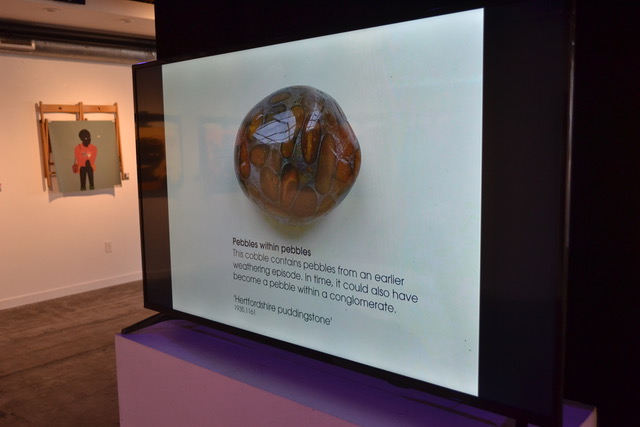
. . .
Tenea Johnson has an uncanny talent for making you doubt reality.
. . . . . . . . . . . . . . . . . You being a grown ass adult,
. . . . . . . . . . . . . . . . . paying taxes and drinking rum in a crystal glass,
. . . . . . . . . . . . . . . . . you say to yourself, “What the hell is a psyhistorian?
. . . . . . . . . . . . . . . . . I’ve never heard of that, and I love history and psychology.
. . . . . . . . . . . . . . . . . Is she furreal? Or is this all some spoiled balogna?
You start thinking this man was actually an “X-Men” before you remember the title of the show, and proceed to feel about as silly as a Gen Z kid on Tik Tok. Unfortunately I can’t tell ya if any of this is real or not, or how much of the stories are real, but this paranormal caption makes me wonder about a lot of things. Like why wouldn’t someone with a superpower like that find a way to escape? He could use that instrument he’s holding to whack some slave patroller upside the head for sure.
But as if he reads my mind “That’s what you’re really asking ain’t it?” He already knows I’m asking why he didn’t leave, and his answer is simple, he had a gift, a leg up, and to not use that to help his kin… well dang that’d be
. . . . . . . . . . . . . . . . . pretty. . . . . . . . . . . . . . . . . . . . . . . . . . . . .
. . . . . . . . . . . . . . . . . . . . . . . . . . . . .low
. . . . . . . . . . . . . . . . . . . . . . . . . . . . . . . . . . of
. . . . . . . . . . . . . . . . . . . . . . . . . . . . . . . . . . . . . . . . . . . . . . . . . some
. . . . . . . . . . . . . . . . . . . . . . . . . . . . . . . . . . . . . . . . . . . . . . . . . . . body
. . .
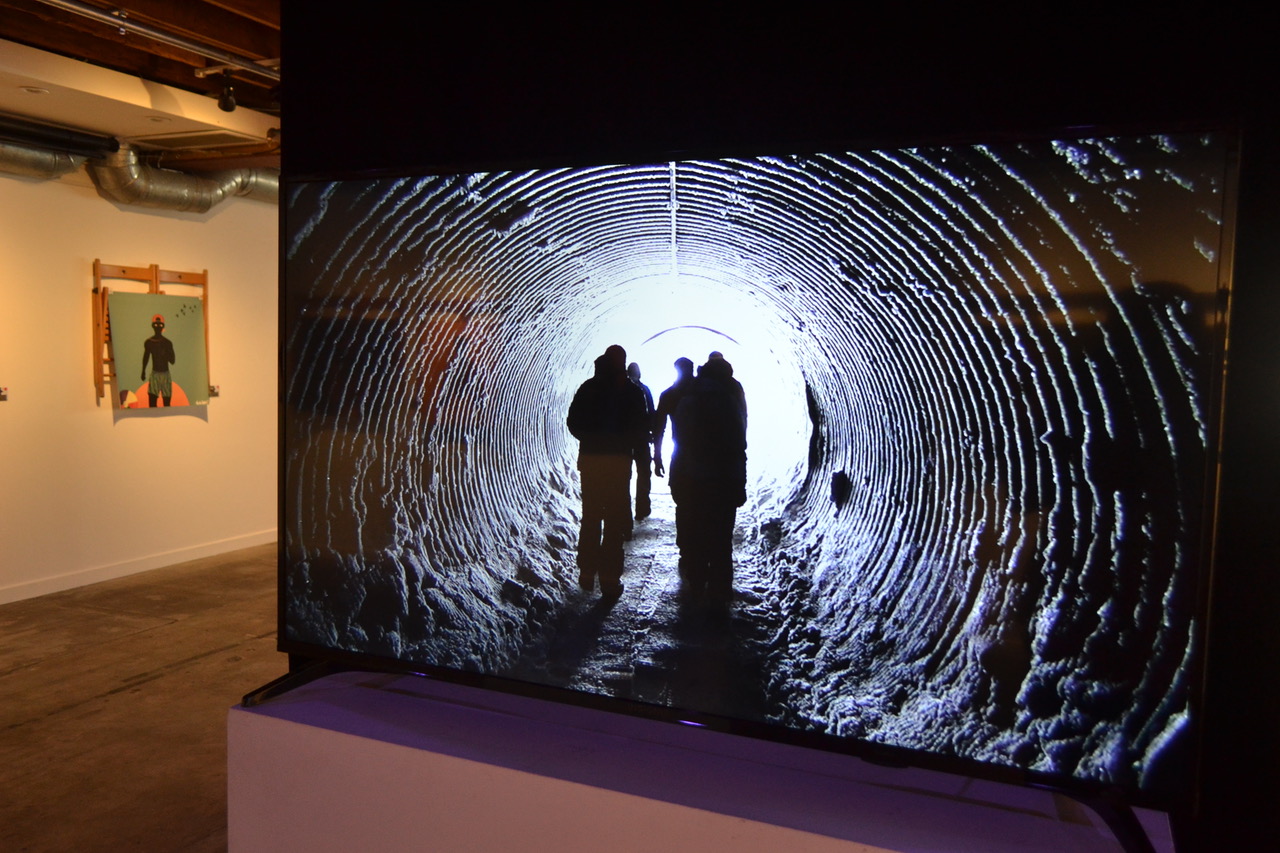
. . .
TV screens and the backs of cupboards
I’ve never seen a story told by slideshow before. Words fall into place, literally ascending down a black screen to tell a story you can’t tell is real or fake. That suspension of disbelief is the centerpiece of Tenea Johnson’s storytelling, along with a profound sense of justice for African American narratives.
Johnson reimagines the past of my people through a more empowered lens. She offers us new histories where we have gifted powers, heightened agency, and benevolent spirits and hackers that keep us safe in the night.
Like a gargoyle, her short and often spooky pieces at the Studio@620 come alive at night, aim to protect our dignity, and shroud us in a slow grace rarely allowed by text books and nosey neighbors. Tenea Johnson offers us another method to explore “Blackness” with speculative fiction, and take back what’s been stolen and hidden away into the cupboards of near absurdity.
. . .
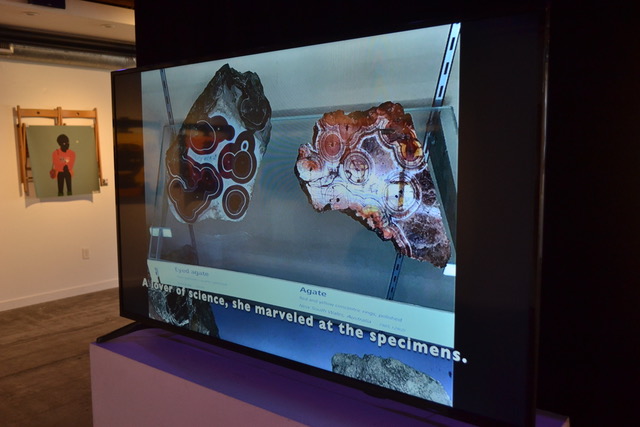
. . .
She offers a unique, time traveling experience. Her machine doesn’t buzz or hum, or strobe lights, a rupture the air. It’s as quiet as air conditioning, and as plain as branches rocking their hips in the breeze, in fact, her machine doesn’t make any sound at all.
But the words deafen and careen down every orifice. They offer you a look into the forgotten spaces, and the spaces yet to be.
My pencil dulls
and my scribbles swell with rushing silence and Tenea’s stories carry on whether you watch them or not, like a stream in a valley, it goes on with or without you, the stories of the enslaved, freed, escaped, secret Blacks, who digest a part of themselves to steal away, but “stealing” is as messy as my cursive writing, for, how can you steal what was already yours?
. . .
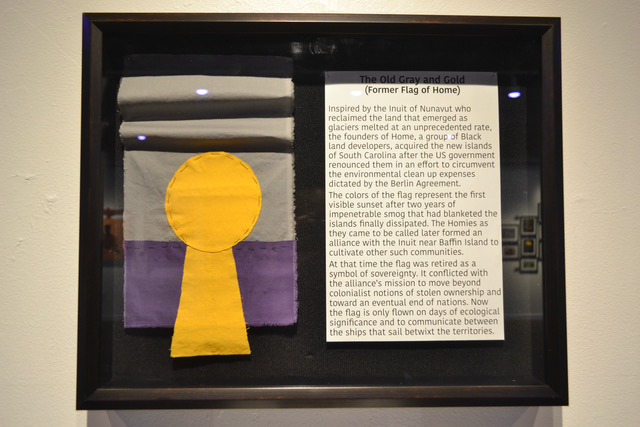
. . .
Like Robert Jones Jr. said in The Prophets, you gotta bury parts of yourself deep down where you almost forget it’s there to endure the indifferent suffering of slavery, of wage slavery, of segregation, of beatings, of lynchings, of being murdered by the police, of white people telling you to suck it up like the other immigrants, of no one caring about you and your dark brown skin but your kin.
We go to that place.
That place, tucked in the cupboard of marrow,
next to the seasoning salt
under the can of Glory Greens
when your mom doesn’t have time to make em by hand.
We go to that place and recover.
Sober and cautious, but also playful,
Johnson reaches to the back of that cupboard
where her hand hits the wood and brings out
whatever it is that my people have had in their pockets
and cupboards for so long.
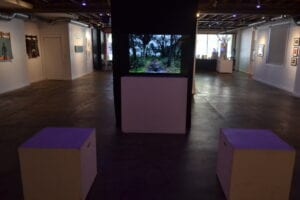
I can’t tell you what’s inside
my people would have my neck
for spilling the baked beans,
but maybe you’ll find it here,
at the bottom of her pockets,
in the back of her cupboard.
Look briefly,
don’t linger.
Hold your breath
and be fast.
My people desire respect,
don’t stay too long.
My pencil dulls.
. . .
Tenea D. Johnson is a speculative fiction author, poet and musician based in St. Petersburg.
Explore her work at teneadjohnson.com.
All photos by Denzel Johnson-Green
. . .
